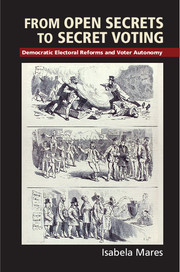Book contents
- Frontmatter
- Contents
- Figures
- Tables
- Acknowledgments
- 1 Introduction
- 2 The Protection of Voters' Autonomy
- 3 Electoral Intimidation by State Employees
- 4 Electoral Intimidation by Employers
- 5 The Production of Irregularities during Elections: A Quantitative Analysis
- 6 The Adoption of Electoral Reforms
- 7 Labor Scarcity, Rural Inequality, and Electoral Reforms: The Determinants of Electoral Reform in the Prussian Electoral System
- 8 Voting for Opposition Candidates: Economic Concentration, Skills, and Political Support for Social Democracy
- 9 Dilemmas on the Right and the Road to Proportional Representation
- 10 From Macro- to Micro-Historical Analysis in Comparative Research
- References
- Index
- Other Books in the Series
9 - Dilemmas on the Right and the Road to Proportional Representation
Published online by Cambridge University Press: 05 July 2015
- Frontmatter
- Contents
- Figures
- Tables
- Acknowledgments
- 1 Introduction
- 2 The Protection of Voters' Autonomy
- 3 Electoral Intimidation by State Employees
- 4 Electoral Intimidation by Employers
- 5 The Production of Irregularities during Elections: A Quantitative Analysis
- 6 The Adoption of Electoral Reforms
- 7 Labor Scarcity, Rural Inequality, and Electoral Reforms: The Determinants of Electoral Reform in the Prussian Electoral System
- 8 Voting for Opposition Candidates: Economic Concentration, Skills, and Political Support for Social Democracy
- 9 Dilemmas on the Right and the Road to Proportional Representation
- 10 From Macro- to Micro-Historical Analysis in Comparative Research
- References
- Index
- Other Books in the Series
Summary
The improvement in the protection of electoral secrecy had far-reaching consequences for political competition in German elections to the Reichstag. These changes in the electoral law reduced the opportunities for electoral intimidation. By emboldening voters to take electoral risks, the Rickert law made possible the spectacular political growth of the Social Democratic Party (SPD) during the final elections of the period. These gains for Social Democrats came at the expense of parties on the right. Because of the reduction in their ability to monitor voters' choices, many candidates on the right lost districts that had previously been their electoral strongholds.
This chapter investigates the implications of the changes in electoral competition for German parties on the right. My analysis focuses on one dimension of electoral competition that was salient for parties rather than candidates: the ability of parties to translate votes into parliamentary seats. I find that the Rickert law affected parties on the right in different ways depending on the district-level distribution of their support. Those right-wing parties whose voters were concentrated in particular regions – such as the Zentrum or the Conservatives – experienced no changes in the vote-seat proportionality in the aftermath of the Rickert law. The situation was entirely different for other right- wing parties, such as the National Liberals and Free Liberals. The ability of these parties to convert their votes into parliamentary seats deteriorated dramatically during the elections that were held after the adoption of the Rickert law and the onset of World War I.
This worsening of the relationship between the votes won by individual candidates and the number of seats held by representatives of the respective parties in the Reichstag led to an intense search by politicians for a solution that could allow their parties to survive electorally in the changed electoral landscape. In the process, the positions of several parties about questions of electoral reform experienced a gradual change.
- Type
- Chapter
- Information
- From Open Secrets to Secret VotingDemocratic Electoral Reforms and Voter Autonomy, pp. 202 - 230Publisher: Cambridge University PressPrint publication year: 2015



